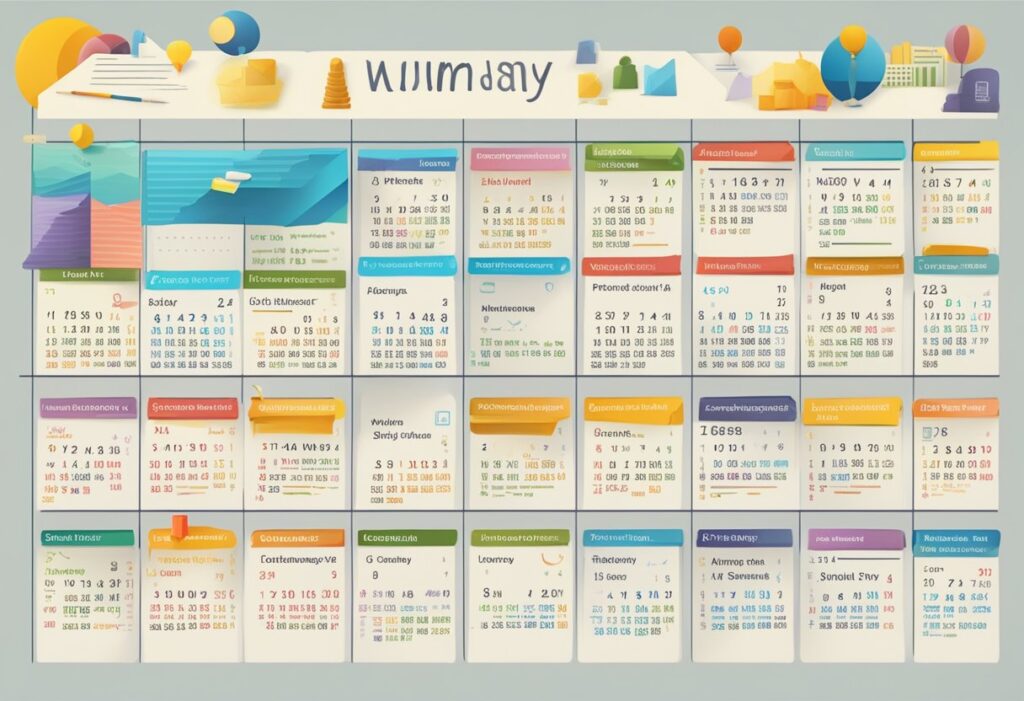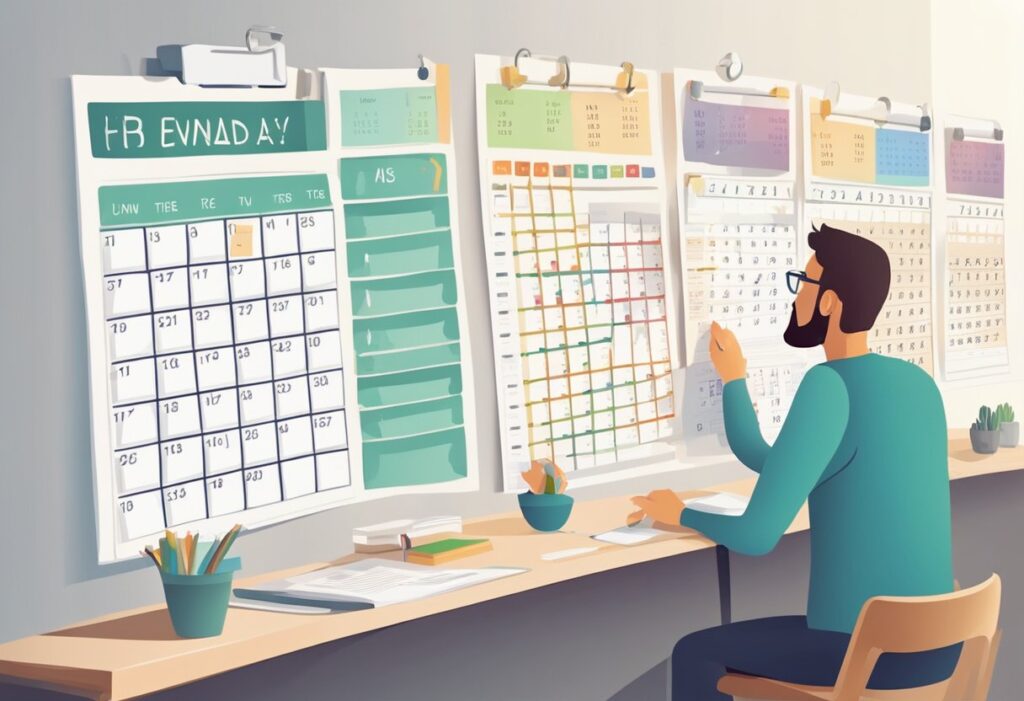- Email: [email protected]
- phone: +44 (0) 203 916 5117
15 Jan

Calendars are an essential tool for managing time and staying organized. They are widely used for scheduling appointments, meetings, and events, both for personal and professional purposes. Adding events to calendars is an important step in maximizing productivity and ensuring that important tasks are not overlooked.

The role of calendars in effective time management cannot be overstated. By adding events to calendars, individuals can keep track of their schedule and avoid conflicts. This allows them to allocate their time effectively and prioritize tasks based on their importance. Calendars also help individuals to plan ahead and avoid last-minute stress and rush.
Maximizing productivity with calendar features is another benefit of using calendars. Many calendar platforms offer features such as reminders, notifications, and integrations with other applications. These features help individuals to stay on top of their schedule and ensure that they do not miss important deadlines or events. By utilizing these features, individuals can streamline their workflow and focus on the tasks that matter most.
Key Takeaways
- Adding events to calendars is crucial for effective time management and productivity.
- Calendar features such as reminders and notifications can help individuals stay on top of their schedule.
- Choosing the right calendar platform and integrating calendars for business and personal use can further enhance productivity.
The Role of Calendars in Effective Time Management

Calendars are an essential tool for effective time management. They help individuals keep track of their schedule, appointments, and deadlines. By using a calendar, individuals can manage their time efficiently and ensure that they are meeting their commitments.
Understanding Time Blocks and Deadlines
One of the important features of a calendar is the ability to create time blocks. Time blocks are specific periods of time that are dedicated to a particular task or activity. By creating time blocks, individuals can ensure that they are allocating enough time for each task and not overcommitting themselves.
Calendars also help individuals manage their deadlines. By setting deadlines for tasks and appointments, individuals can ensure that they are completing their work on time and not missing any important deadlines. This is especially important for individuals who have multiple projects or tasks to manage.
Balancing Tasks and Appointments
Calendars can also help individuals balance their tasks and appointments. By using a calendar, individuals can see how much time they have available for each task and appointment. This can help them prioritize their work and ensure that they are not overcommitting themselves.
In addition, calendars can help individuals manage their appointments more effectively. By scheduling appointments in advance and setting reminders, individuals can ensure that they are not missing any important meetings or events.
Overall, calendars play a crucial role in effective time management. They help individuals manage their time, prioritize their work, and ensure that they are meeting their commitments. By using a calendar, individuals can achieve their goals and be more productive.
Maximizing Productivity with Calendar Features
Calendars are an essential tool for staying organized and productive. By adding events and tasks to a calendar, individuals can keep track of their schedules and ensure that they do not miss any important deadlines or appointments. However, there are many other features of calendars that can help people maximize their productivity.
Utilizing Reminders and Notifications
One of the most useful features of a calendar is the ability to set reminders and notifications. By setting reminders, individuals can ensure that they do not forget important tasks or events. Notifications can also be set up to alert individuals of upcoming events or tasks. This can be especially useful for individuals who have busy schedules and may not have time to check their calendar regularly.
Leveraging Recurring Events and Tasks
Recurring events and tasks are another useful feature of calendars. By setting up recurring events or tasks, individuals can save time and ensure that they do not forget to complete important tasks. For example, individuals can set up a recurring task to pay their bills on a certain day of the month. This can help them stay on top of their finances and avoid late fees.
Calendars can also be used to schedule recurring meetings or appointments. This can be especially useful for individuals who have regular meetings with clients or colleagues. By scheduling these meetings in advance, individuals can ensure that they do not double-book their time and can prepare for the meeting in advance.
In conclusion, there are many features of calendars that can help individuals maximize their productivity. By utilizing reminders and notifications, individuals can ensure that they do not forget important tasks or events. Leveraging recurring events and tasks can also help individuals save time and stay organized. Overall, calendars are an essential tool for staying organized and productive.
Integrating Calendars for Business and Personal Use
Calendars are an essential tool for organizing and managing time. They are used for scheduling appointments, meetings, and events, and for keeping track of deadlines and tasks. Integrating calendars for business and personal use can help individuals manage their time more efficiently and avoid conflicts.
Synchronizing Multiple Calendars
Synchronizing multiple calendars is an important feature for individuals who use separate calendars for business and personal use. Most calendar applications allow users to sync their calendars across multiple devices, such as smartphones, tablets, and computers. This feature ensures that all events and appointments are up-to-date and accessible from any device.
Users can also sync their calendars with other individuals, such as colleagues or family members. This feature allows for better coordination and avoids scheduling conflicts. For example, a business calendar can be synced with a personal calendar to avoid scheduling a personal event during a business meeting.
Sharing and Collaboration Tools
Sharing and collaboration tools are important features for businesses that require coordination among team members. Most calendar applications allow users to share their calendars with other individuals, such as colleagues or clients. This feature allows for better coordination and avoids scheduling conflicts.
Users can also set permissions for shared calendars, such as view-only or edit permissions. This feature allows for better collaboration and avoids conflicts. For example, a business calendar can be shared with team members to avoid scheduling conflicts and ensure everyone is on the same page.
In summary, integrating calendars for business and personal use can help individuals manage their time more efficiently and avoid conflicts. Synchronizing multiple calendars and using sharing and collaboration tools are important features for better coordination and collaboration.
Choosing the Right Calendar Platform
Choosing the right calendar platform is crucial for effective calendar management. With so many options available, it can be difficult to determine which one is best for you. In this section, we will explore the pros and cons of online and physical planners and evaluate user-friendly interfaces.
Comparing Online and Physical Planners
Online calendars, such as Google Calendar, offer the advantage of being accessible from anywhere with an internet connection. This makes it easy to share calendars with others and collaborate on events. Online calendars also provide reminders and notifications, ensuring that you never miss an important event. However, they also have some drawbacks, such as the need for an internet connection and the potential for technical issues.
Physical planners, on the other hand, provide a tangible way to keep track of events and tasks. They don't require an internet connection, making them reliable and accessible at all times. Physical planners also allow for more customization and creativity in organizing events. However, they can be bulky and difficult to carry around, and they don't provide the same level of convenience as online calendars.
Evaluating User-Friendly Interfaces
When choosing a calendar platform, it's important to consider the user interface. A user-friendly interface can make all the difference in how effectively you can manage your events and tasks. Look for a platform that is intuitive and easy to navigate, with clear and concise instructions. Some platforms, such as Let's Calendar, offer features like bulk and mass calendar invites, making it easy to schedule events with multiple attendees.
In conclusion, the choice between an online or physical planner ultimately depends on personal preference and needs. Consider the advantages and disadvantages of each option, as well as the user interface, to determine which platform is right for you.
Related Posts:
Strategic Planning for Long-Term Goals

Strategic planning is crucial for achieving long-term goals. It involves setting milestones and important dates, prioritizing commitments and responsibilities, and aligning resources and capabilities towards a common goal.
Setting Milestones and Important Dates
Setting milestones and important dates is essential for achieving long-term goals. By breaking down long-term goals into smaller, achievable milestones, it becomes easier to track progress and stay motivated. These milestones can be daily, weekly, monthly, or yearly, depending on the nature of the goal. For example, if the long-term goal is to organize a successful event, the milestones could include booking a venue, inviting speakers, and promoting the event.
Important dates are also crucial for achieving long-term goals. These could include deadlines, meetings, and other events that are critical for the success of the goal. By adding these dates to a calendar, it becomes easier to plan and prepare for them in advance. It also helps to avoid conflicts and ensure that all commitments are met on time.
Prioritizing Commitments and Responsibilities
Prioritizing commitments and responsibilities is another important aspect of strategic planning. It involves identifying the most important tasks and allocating resources accordingly. By prioritizing commitments, it becomes easier to focus on the most critical aspects of achieving long-term goals. This helps to avoid distractions and stay on track.
It is also important to delegate responsibilities effectively. By assigning tasks to the most qualified individuals, it becomes easier to achieve long-term goals. This helps to ensure that all tasks are completed on time and to a high standard.
In conclusion, strategic planning is essential for achieving long-term goals. By setting milestones and important dates, prioritizing commitments and responsibilities, and aligning resources and capabilities towards a common goal, it becomes easier to achieve success.
Key Challenges in adding events to calendars manually
Adding events to calendars manually can be a tedious and time-consuming task, which can lead to errors and missed deadlines. Some of the key challenges faced when adding events to calendars manually are:
Using tools to automate your work
One of the biggest challenges of adding events to calendars manually is the lack of automation. Without automation, every event has to be added manually, which can take up a lot of time and effort. This can lead to errors and missed deadlines, which can be costly for businesses.
Using Let's Calendar - Automation tool to add events to calendars automatically
Fortunately, there are tools available that can help automate the process of adding events to calendars. One such tool is Let's Calendar, an automation tool that can help businesses save time and effort by automating the process of adding events to calendars.
Benefits of using Let's Calendar vs Manual work
Using Let's Calendar has several benefits over manual work. First, Let's Calendar can help businesses save time and effort by automating the process of adding events to calendars. This can help businesses focus on other important tasks, such as marketing, sales, and customer service.
Second, Let's Calendar can help businesses personalize their calendars to meet their specific needs. With Let's Calendar, businesses can customize their calendars to include only the events that are relevant to their business. This can help businesses stay organized and focused on their goals.
Finally, Let's Calendar can help businesses save money by reducing the amount of manpower required to add events to calendars manually. With Let's Calendar, businesses can automate the process of adding events to calendars, which can help them save money on labor costs.
In conclusion, adding events to calendars manually can be a challenging and time-consuming task. However, with the help of tools like Let's Calendar, businesses can automate the process of adding events to calendars, which can help them save time, effort, and money.
Frequently Asked Questions
How does maintaining an updated calendar enhance personal productivity?
Maintaining an updated calendar is a crucial aspect of personal productivity. It helps individuals stay organized and on top of their commitments, thereby reducing stress and anxiety. Having a clear view of upcoming events and deadlines enables them to allocate time and resources effectively, ensuring that they can complete tasks on time and avoid last-minute rushes. Additionally, it provides a sense of control and accountability, which can boost confidence and motivation.
What are the benefits of using a calendar for managing professional deadlines?
Using a calendar for managing professional deadlines has several benefits. Firstly, it enables individuals to prioritize tasks based on their urgency and importance, thereby ensuring that they can meet deadlines efficiently. Secondly, it helps them stay on track with long-term projects by breaking them down into smaller, manageable tasks and scheduling them accordingly. Thirdly, it facilitates collaboration and communication with team members by providing a shared view of schedules and deadlines.
In what ways can adding events to a calendar improve time management?
Adding events to a calendar can significantly improve time management by providing a clear view of upcoming commitments. It enables individuals to plan their schedules in advance, allocate time and resources efficiently, and avoid overcommitting or double-booking. Additionally, it helps them identify and eliminate time-wasting activities, prioritize tasks based on their importance, and optimize their productivity.
Why is it crucial to include both personal and professional events in your calendar?
It is crucial to include both personal and professional events in your calendar because they are interconnected and can impact each other. For instance, a personal event such as a doctor's appointment might require an individual to take time off work, which can affect their professional schedule. Similarly, a professional event such as a meeting might require them to adjust their personal commitments. By including both types of events in their calendar, individuals can ensure that they have a holistic view of their schedule and can plan accordingly.
How can calendar reminders aid in ensuring important commitments are not overlooked?
Calendar reminders are an effective tool for ensuring that important commitments are not overlooked. They can be set up to notify individuals in advance of upcoming events or deadlines, thereby providing ample time for preparation and planning. Additionally, they can be customized to suit individual preferences and needs, such as frequency, mode of notification, and level of urgency. By using calendar reminders, individuals can stay on top of their commitments and avoid missing important deadlines.
What is the significance of regularly reviewing and adjusting your calendar for optimal planning?
Regularly reviewing and adjusting your calendar is crucial for optimal planning. It enables individuals to evaluate their progress, identify areas for improvement, and make necessary adjustments to their schedule. For instance, they can review their calendar weekly or monthly to ensure that they are on track with their goals, adjust their schedule based on changing priorities or circumstances, and optimize their productivity. Additionally, it provides a sense of control and accountability, which can boost confidence and motivation.








